Good Reading
August 20th, 2008Check out http://thearchdruidreport.blogspot.com/ for some of the wisest, in-depth, thought provoking blog articles on what our society is facing in a post-peak oil world.
Check out http://thearchdruidreport.blogspot.com/ for some of the wisest, in-depth, thought provoking blog articles on what our society is facing in a post-peak oil world.
Well, it’s one degree Fahrenheit outside and I am keeping my self warm with thoughts of spring planting. Our average last frost in central Iowa is about 12 weeks away. It’s time to get your seeds and plants ordered. You can even start some flower and allium family seeds now. I’ve had good luck growing leeks from seed and they don’t take much space. I sow them thickly in a 3” pot, grow them under fluorescent shop lights (more on that in another article), trim the tops back so they stay about 3” tall, and when it comes time to plant them, dump the pot out and grab each individual seedling and put it in a little trench.
Another exciting thing about joining PFI was the fact that their annual conference was going to be held this year just a couple miles from my home and it was packed with all sorts of interesting presentations. I attended the conference this Friday and Saturday and it was a very informative and enjoyable time. It also seemed that about anyone involved in sustainable agriculture and local foods was in attendance.
I attended a session for new farmers or people considering the plunge, and a sustainable energy production session on Friday. I also had the pleasure of seeing my fellow Cornellian, Laura Krouse, receive the Spencer Award honoring farmers, educators and researchers who have made a significant contribution toward stability of mainstream family farms in Iowa. Laura operates Abbe Hills Gardens, a 120 family CSA near Mount Vernon.
We brought the whole family to King Corn Friday night. Anne and I, and our ten year old son found it very entertaining and informative. Our six year old daughter only lasted through half the movie. She hadn’t gone to the movie with high expectations but the next morning said that it was better than she expected. Anyhow, the rest of us highly recommend it.
Anyhow, the rest of us highly recommend it.
Kamyar Enshayan from UNI was presented with the Sustainable Agriculture Achievement Award Saturday morning. Kamyar has been promoting local food for over a decade including establishing the Buy Fresh Buy Local campaign in Northeast Iowa.
Also on Saturday I sat in on an update on the Iowa Food Cooperative, listened to Richard de Wilde of Harmony Valley Farm describe how he went from a $500 loss in the mid 70s to a profitable 1000 family CSA today. We learned about all the planning, management, equipment and people that go into an operation of that size.
The only disappoint for me was to hear that next year’s conference won’t be quite so close to home, but will be held instead at Marshalltown Community College.
I’ve been thinking about joining Practical Farmers of Iowa for quite a few years now and finally did this winter. PFI has been a leader in exploring environmentally friendly and economically successful farming approaches, and promoting local foods for years. About a year ago I read their press release announcing the creation of the Iowa Food Cooperative and knew that I wanted to get involved. I had been seriously looking at ways to evolve this Think Global Eat Local web site into an online ordering system but it was clear that I should see how I could get involved with the IFC instead.
The Iowa Food Cooperative is going to be a web based system that allows consumers to order locally produced products from local farmers on a monthly basis (to start). Those orders will be collected and distributed from a central location (in Des Moines at the start). It is modelled after similar systems in place in Oklahoma and Nebraska. The IFC should supplement existing farmer’s markets and CSAs, by providing more staple products then those markets.
Bookmark this site or subscribe to the feed and stay tuned for updates.
I was asked to do a presentation on Permaculture at the Caucus of the Future being held today and tomorrow at the Drake Legal Clinic. It went well and I enjoyed meeting a variety of people.
In particular, I enjoyed meeting Elton Davis. Elton is heavily into permaculture and is working on a crop rotation of sorghum and sunflowers. Sorghum is high in sugar and useful for ethanol. Sunflowers are high in oil and useful for biodiesel. I hope to learn more about his projects and share them with you.
I’ve uploaded my presentation as a series of web pages if you care to take a look. I hope you’ll find it informative. Special thanks to Bill Wilson over at Midwest Permaculture for putting together the majority of it.
We talked about Kris and Marty Travis’ success in harvesting thousands of dollars worth of wild edibles from their farm while they waited for organic certification. A really good book to check out for identifying wild edibles is Steve Wildman Brill’s Identifying and Harvesting Edible and Medicinal Plants in Wild (and Not So Wild) Places. If you buy it after clicking that link I get a tiny commision from Amazon, or head on down and support your local bookstore.
I mentioned that one of my New Year’s resolutions is to add a post to this site each week so I how you will add comments and keep after me to get it done.
You’ve heard of pub crawls, but farm crawls? Well, five farms in South Central Iowa banded together and sponsored an afternoon of farm tours on October 7th. You can read more about it at www.farmcrawl.com. My family had a great time and managed to visit four of the five farms. Check back soon for photos and more information on the food and fun.
I love fall — especially when it comes to food. I love the hearty, filling nature of apples, potatoes, winter squash, carrots, parsnips… It’s also nice to have some cool days when heating up the kitchen with cooking doesn’t seem counter productive to the task of trying to keep cool.
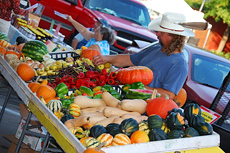 I also love the colors of fall. I visited the second-to-last Valley Junction Farmer’s Market to stock up on some items, and one stand really stood out: Circle M Produce from Martensdale Iowa. I visited with Circle M’s proprieter Mike Misjak. Mike is at a farmer’s market about every day of the week, except Sunday when he’s busy picking. He helped start the Norwalk farmer’s market on Fridays. On the day I visited, he had an abundance of winter squash, pumpkins, peppers, some summer squash, green beans, and watermelons.
I also love the colors of fall. I visited the second-to-last Valley Junction Farmer’s Market to stock up on some items, and one stand really stood out: Circle M Produce from Martensdale Iowa. I visited with Circle M’s proprieter Mike Misjak. Mike is at a farmer’s market about every day of the week, except Sunday when he’s busy picking. He helped start the Norwalk farmer’s market on Fridays. On the day I visited, he had an abundance of winter squash, pumpkins, peppers, some summer squash, green beans, and watermelons.
You might be surprised to find an orchard in Urbandale (9875 Meredith Drive) and I was at first, until I considered just how fast the suburbs surrounding Des Moines have been growing. I witnessed it first hand from my Grandparent’s house near Railroad and Grand, which 25 years ago bordered corn fields and now is likely near the population center of West Des Moines.
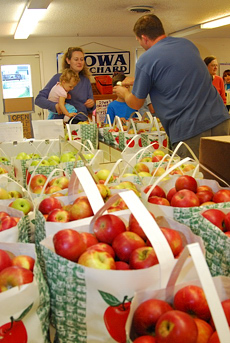 At the Iowa Orchard we met Bryan Etchen. Bryan’s family purchased the orchard in 1974 and he took it over in 1991. In addition to their Meredith Drive location, they have other orchards in the area. This year’s late frost (freeze?) caused them to have about 90% fewer apples than normal. Fortunately, Bryan has relationships with other orchards and had an ample supply of apples. Some of the varieties available when we were there in September: Cortland, Johnathan, Ozark Beauty, Lura Red, Wealthy, and my favorite for fresh eating, Honey Crisp. Varieties you’ve never heard of? Don’t worry — Bryan and his staff are quick to hand out samples and provide recommendations. We purchased a peck each of Honey Crisp and Wealthy. As I write this a couple of weeks later, the Honey Crisps are nearly gone. I’ve sampled a few of the Wealthy apples from the back of the fridge, and keep begging my wife to make this wonderful "Good Neighbor" apple cake recipe she has. If I succeed, I’ll try to get the recipe and photos online to share.
At the Iowa Orchard we met Bryan Etchen. Bryan’s family purchased the orchard in 1974 and he took it over in 1991. In addition to their Meredith Drive location, they have other orchards in the area. This year’s late frost (freeze?) caused them to have about 90% fewer apples than normal. Fortunately, Bryan has relationships with other orchards and had an ample supply of apples. Some of the varieties available when we were there in September: Cortland, Johnathan, Ozark Beauty, Lura Red, Wealthy, and my favorite for fresh eating, Honey Crisp. Varieties you’ve never heard of? Don’t worry — Bryan and his staff are quick to hand out samples and provide recommendations. We purchased a peck each of Honey Crisp and Wealthy. As I write this a couple of weeks later, the Honey Crisps are nearly gone. I’ve sampled a few of the Wealthy apples from the back of the fridge, and keep begging my wife to make this wonderful "Good Neighbor" apple cake recipe she has. If I succeed, I’ll try to get the recipe and photos online to share.
Back to Iowa Orchard… this summer I purchased peaches on various occasions, hoping to find the perfect one — with little success. Seeing that Bryan had Colorado peaches, I decided to give them a try. Unfortunately, they were on par with the others. Perhaps it was a poor year everywhere for peaches?
In addition to the fresh fruits, they offer apple butter, pies, fruit jams, marinades, and other fruits. We purchased one of their cherry pies and it was wonderful (this coming from someone who typically isn’t fond of cherry pies). Fresh cherries, a hint of almond flavoring, flaky crust… it didn’t last long.
You can swing by their store seven days a week, or find them at many of the farmer’s markets.
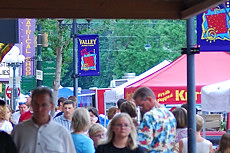 I’d bet that if you said “farmers market” to someone in the Des Moines area they would immediately think of the Downtown Farmers Market in downtown Des Moines on Saturday mornings. Well a close rival to the Downtown market is the Valley Junction Farmers Market on Thursday evenings. It’s at Fifth and Railroad in West Des Moines and runs from 4:00 to 8:00PM until September 27th.
I’d bet that if you said “farmers market” to someone in the Des Moines area they would immediately think of the Downtown Farmers Market in downtown Des Moines on Saturday mornings. Well a close rival to the Downtown market is the Valley Junction Farmers Market on Thursday evenings. It’s at Fifth and Railroad in West Des Moines and runs from 4:00 to 8:00PM until September 27th.
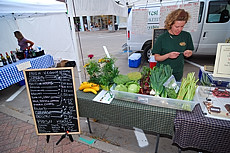 My family and I visited the market yesterday evening. We arrived rather late, which is a mistake this time of year as local farmer’s crops are not quite up to full production and a lot of items were sold out before we arrived.
My family and I visited the market yesterday evening. We arrived rather late, which is a mistake this time of year as local farmer’s crops are not quite up to full production and a lot of items were sold out before we arrived.
We met Amy Boyer, who with her husband Jason, own The Harvest Barn in Osceola. The Boyers had vegetables and fudge to sell but Amy was quick to point out that their main focus was on their Limosine/Angus natural beef and natural pork products. She was very excited when I mentioned that I was looking at ways to create a local food distribution business. 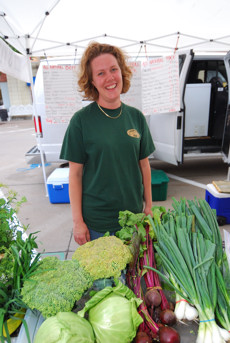 She mentioned that they had been debating about how to sell to metro customers once the farmer’s markets close for the season… this reinforced my feeling that their is a need to provide local food distribution options especially in the winter months.
She mentioned that they had been debating about how to sell to metro customers once the farmer’s markets close for the season… this reinforced my feeling that their is a need to provide local food distribution options especially in the winter months.
You can find out more about the Boyers at their website: www.theharvestbarn.com
Bad Behavior has blocked 279 access attempts in the last 7 days.